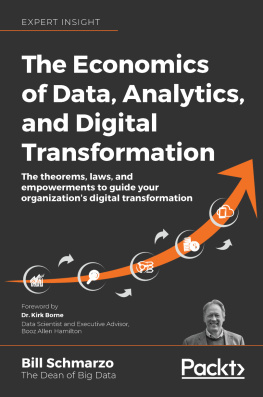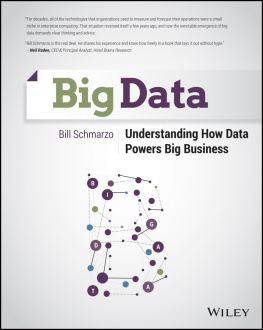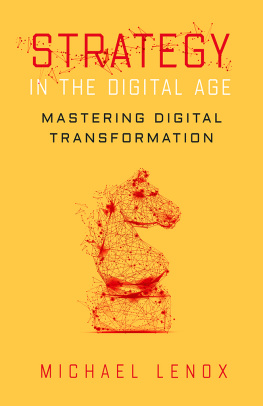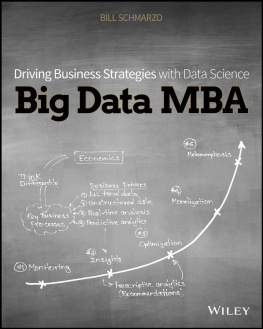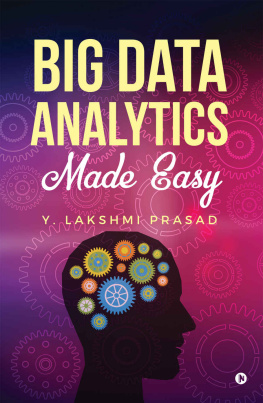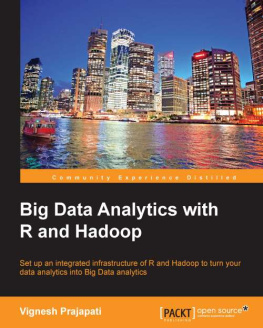Bill Schmarzo - The Economics of Data, Analytics, and Digital Transformation
Here you can read online Bill Schmarzo - The Economics of Data, Analytics, and Digital Transformation full text of the book (entire story) in english for free. Download pdf and epub, get meaning, cover and reviews about this ebook. year: 2020, publisher: Packt, genre: Business. Description of the work, (preface) as well as reviews are available. Best literature library LitArk.com created for fans of good reading and offers a wide selection of genres:
Romance novel
Science fiction
Adventure
Detective
Science
History
Home and family
Prose
Art
Politics
Computer
Non-fiction
Religion
Business
Children
Humor
Choose a favorite category and find really read worthwhile books. Enjoy immersion in the world of imagination, feel the emotions of the characters or learn something new for yourself, make an fascinating discovery.
- Book:The Economics of Data, Analytics, and Digital Transformation
- Author:
- Publisher:Packt
- Genre:
- Year:2020
- Rating:3 / 5
- Favourites:Add to favourites
- Your mark:
- 60
- 1
- 2
- 3
- 4
- 5
The Economics of Data, Analytics, and Digital Transformation: summary, description and annotation
We offer to read an annotation, description, summary or preface (depends on what the author of the book "The Economics of Data, Analytics, and Digital Transformation" wrote himself). If you haven't found the necessary information about the book — write in the comments, we will try to find it.
The Economics of Data, Analytics, and Digital Transformation — read online for free the complete book (whole text) full work
Below is the text of the book, divided by pages. System saving the place of the last page read, allows you to conveniently read the book "The Economics of Data, Analytics, and Digital Transformation" online for free, without having to search again every time where you left off. Put a bookmark, and you can go to the page where you finished reading at any time.
Font size:
Interval:
Bookmark:
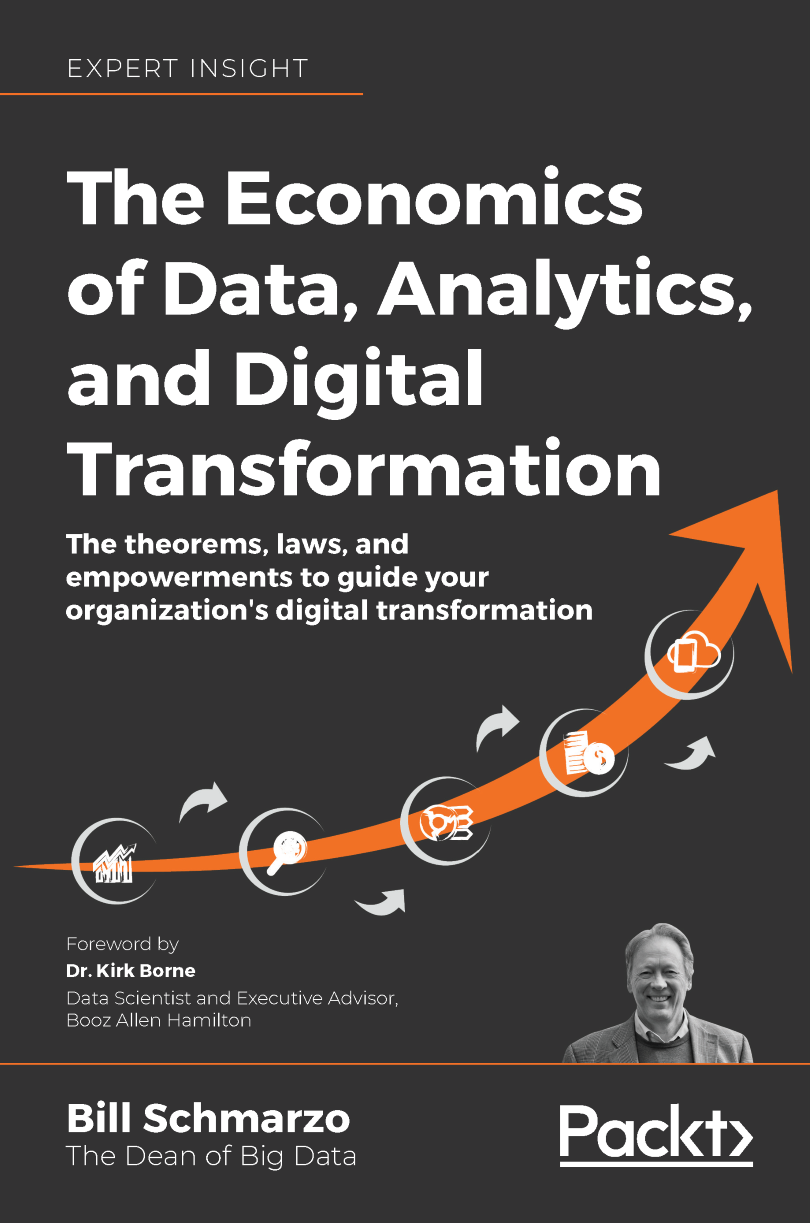
The Economics of Data, Analytics, and Digital Transformation
The theorems, laws, and empowerments to guide your organization's digital transformation
Bill Schmarzo

BIRMINGHAM - MUMBAI
The Economics of Data, Analytics, and Digital Transformation
Copyright 2020 Packt Publishing
All rights reserved. No part of this book may be reproduced, stored in a retrieval system, or transmitted in any form or by any means, without the prior written permission of the publisher, except in the case of brief quotations embedded in critical articles or reviews.
Every effort has been made in the preparation of this book to ensure the accuracy of the information presented. However, the information contained in this book is sold without warranty, either express or implied. Neither the author, nor Packt Publishing or its dealers and distributors, will be held liable for any damages caused or alleged to have been caused directly or indirectly by this book.
Packt Publishing has endeavored to provide trademark information about all of the companies and products mentioned in this book by the appropriate use of capitals. However, Packt Publishing cannot guarantee the accuracy of this information.
Producer: Tushar Gupta
Content Development Editors: Bhavesh Amin and Edward Doxey
Technical Editor: Karan Sonawane
Project Editor: Mrunal Dave
Proofreader: Safis Editing
Indexer: Tejal Soni
Presentation Designer: Sandip Tadge
First published: November 2020
Production reference: 1261020
Published by Packt Publishing Ltd.
Livery Place
35 Livery Street
Birmingham B3 2PB, UK.
ISBN 978-1-80056-1410
www.packt.com

packt.com
Subscribe to our online digital library for full access to over 7,000 books and videos, as well as industry leading tools to help you plan your personal development and advance your career. For more information, please visit our website.
- Spend less time learning and more time coding with practical eBooks and Videos from over 4,000 industry professionals
- Learn better with Skill Plans built especially for you
- Get a free eBook or video every month
- Fully searchable for easy access to vital information
- Copy and paste, print, and bookmark content
Did you know that Packt offers eBook versions of every book published, with PDF and ePub files available? You can upgrade to the eBook version at for more details.
At www.Packt.com , you can also read a collection of free technical articles, sign up for a range of free newsletters, and receive exclusive discounts and offers on Packt books and eBooks.
In today's digital era, every organization has data, and by the ton! Having a lot of data is neither a market discriminator for an organization, nor is it a bragging point anymore (if that ever made sense anyway). The real market discriminators are an organization's data-fueled analytics products that inspire innovation, deliver insights, inform actionable decisions, generate value, and produce mission success for the organization. Data Analytics should first and foremost be about action and value. Consequently, the great value of this book is that it seeks to be actionable. It is not offering a set of static lecture points on analytics that you can sit and reflect upon, but it offers a dynamic progression of purpose-driven ignition points that should lift you out of your seat and that you can act upon. Bill Schmarzo is the perfect author to deliver such analytics insights through this book. He is an experienced, influential, and inspiring exemplar of data analytics leadership, and those characteristics are evident throughout its pages and chapters.
By directly addressing the economics of data, analytics, and digital transformation, Bill affirms one of the greatest defining characteristics of data. Data is not a typical business asset that depletes and depreciates with use. Its economic value is far greater and more interesting than that. Data is a renewable and reusable source, essentially never depleted (at least not depleted in a business cycle lifetime). Data can be used and reused for countless different applications, without diminishing its economic value. The use cases may have varying levels of value, which need to be assessed and evaluated, and that is exactly the theme for most of this book's chapters. We also learn that data is not only a renewable source of value, with essentially zero marginal cost for new applications, but data is also a source for asset creation that appreciates in value.
Clear steps toward achieving actionable insights, discovery from data, economic value from analytics, and forward progress toward true digital transformation are the invaluable contributions of this book. But let us not forget the marvelous collection of infographics that accompany these rich concepts. Anyone who has read Bill's articles will recognize his style of infographics and will know what a great source of knowledge they are. As someone once said (it was me, actually), "a word is worth one milli-picture." Consequently, one can be justified in and forgiven for initially skipping the words and instead first looking at the pictures in this book. They give true meaning to the label "infographic," for they contain a wealth of information, knowledge, lessons learned, and actionable insights too. They also serve as invaluable anchors to the key concepts, theorems, and performance indicators described in the various chapters, thus firmly planting each important lesson in a memorable visual context.
While there are many data analytics books available on the market, many of which help you learn concepts, applications, and use cases, this book goes beyond one-shot learning. The focus here is correctly on continuous learning, not just concepts about data, but learning continuously from datarapidly and effectively in an agile culture of innovation and experimentation! That is what machine learning is all about and what data science isinferring, learning, refining, and relearning! As Bill says, "Data science is about identifying variables and metrics that might be better predictors of performance." That is an experimental (scientific) process that involves data! Data science is only of value to a business when it creates business value. Some analytics and data science projects fail because they are isolated projects (perhaps science experiments) for the R&D department, and thus are not an integral component of business decisions, enterprise planning, and corporate mission. Continuous learning requires humility, empowered teams, and explicit corporate recognition of this truth: "If you aren't failing enough, then you're not learning enough."
One thing that a scientific process does is to separate failed hypotheses and predictions from successful ones. Bill addresses this also, within its business context, when he describes how some organizations fail in their analytics programs due to having too many use cases, not from the lack of use cases. These organizations have not used analytics on their analytics program itself. This meta-approach expertly guides you through the theorems, data asset valuations, and economic principles presented in a unique style throughout this book. The Data Science Value Engineering Framework will steer organizations toward lean, efficient, and effective analytics innovations, outcomes, and mission successes. That might require some unlearning to get started with and to get right, but most learning starts with unlearning. As Bill says, "
Font size:
Interval:
Bookmark:
Similar books «The Economics of Data, Analytics, and Digital Transformation»
Look at similar books to The Economics of Data, Analytics, and Digital Transformation. We have selected literature similar in name and meaning in the hope of providing readers with more options to find new, interesting, not yet read works.
Discussion, reviews of the book The Economics of Data, Analytics, and Digital Transformation and just readers' own opinions. Leave your comments, write what you think about the work, its meaning or the main characters. Specify what exactly you liked and what you didn't like, and why you think so.

